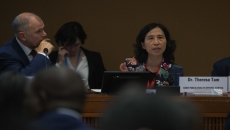Prime Minister Justin Trudeau says the federal government's emergency wage-subsidy program will be extended beyond its early-June endpoint. The program covers 75 per cent of worker pay up to $847 a week to try to help employers keep employees on the job in the face of steep declines in revenue due to the COVID-19 pandemic.
"Since it launched last week employers have applied for subsidies for almost two million workers. And as provinces and territories start to gradually reopen over the coming months and the (Canadian Emergency Response Benefit) becomes less and less needed, this subsidy will play an even greater role," Trudeau said in his daily news conference Friday.
More details on the extension of the wage subsidy will come next week, but Trudeau said the purpose of the program is to help kickstart the economy and boost jobs.
This announcement comes as new Statistics Canada data shows the Canadian economy lost almost two million jobs in April, a record high, as the closure of non-essential services to slow the spread of COVID-19 forced businesses to shutter temporarily.
The loss of 1,993,800 comes on top of more than one million jobs lost in March, and millions more having their hours and incomes slashed.
The unemployment rate soared to 13 per cent as the full force of the pandemic hit, compared with 7.8 per cent in March, Statistics Canada reported Friday morning.
It was the second-highest unemployment rate on record as job losses spread beyond the service sector to include construction and manufacturing.
Economists on average had expected the loss of four million jobs and an unemployment rate of 18 per cent, according to financial markets data firm Refinitiv.
The unemployment rate would have been 17.8 per cent had the agency's labour force survey counted among the unemployed the 1.1 million who stopped looking for work — likely because the COVID-19 economic shutdown has limited job opportunities.
In all, more than one-third of the labour force didn't work or had reduced hours in April, an "underutilization rate" that was more than three times higher than in February before the pandemic struck.
Trudeau offered reassuring words in the wake of the jobs report, saying the federal government will do whatever it can to see those who have lost their employment or seen drops in income recoup those losses.
"These numbers tell us what we already knew: that right now Canadians are hurting because of this pandemic. Everyone has their own story but it all boils down to a very difficult time for a lot of people," he said.
Vulnerable workers who tend to have part-time or temporary work in low-paying jobs have been particularly hurt with heavy job losses. Women have seen larger job losses overall, but the number of men out of work in April closed the gender gap in cumulative unemployment losses.
Nearly all of the job losses for men since February were in full-time work, compared to 69.9 per cent for women.
"This, combined with the different industries in which men and women have lost their jobs — for example, more job losses among men have been in construction, and fewer have been in retail trade — signals that the challenges associated with recovering from the COVID-19 economic shutdown may be different for women and men," the labour force survey says.
Trudeau noted this is one of the first recessions ever that has had such a particularly negative impact on women, vulnerable workers, new Canadians and students.
As Canadian economies begin to reopen, greater focus will be needed on supporting these more marginalized groups, he said, pointing specifically to the need for secure and affordable child care as part of that calculation.
"We need to make sure that as we move forward to rebuilding and creating a more prosperous Canada in the coming months and years we think very, very carefully about how important the work is that is being done by women and by vulnerable Canadians and how we need to make sure we're better supporting them — not just for potential future crises but for business as usual as our country comes back to normal."
In March, health restrictions forced the closure of non-essential businesses, leading to layoffs and cuts in work hours as companies tried to manage costs without enough or any revenue coming in.
Smaller companies — defined as those with less than 20 employees — have shed 30.8 per cent of their workers, medium-sized firms have let 25.1 per cent of workers go, and large companies have seen employment decline by 12.6 per cent.
Hard-hit sectors at the outset include retail, hotels, restaurants and bars, which continued to see losses in April. The losses in the service sector continued in April, down 1.4 million or 9.6 per cent, Statistics Canada says.
Proportionally, the losses were greater in goods-producing sectors like construction and manufacturing, which combined lost 621,000 jobs for a drop of 15.8 per cent after being virtually unchanged in March.
Job losses in April were spread across all provinces, with Quebec particularly hard-hit. The unemployment rate in the province climbed to 17 per cent, the highest rate among all provinces and the highest rate for Quebec itself in over more than four decades of comparable data.





